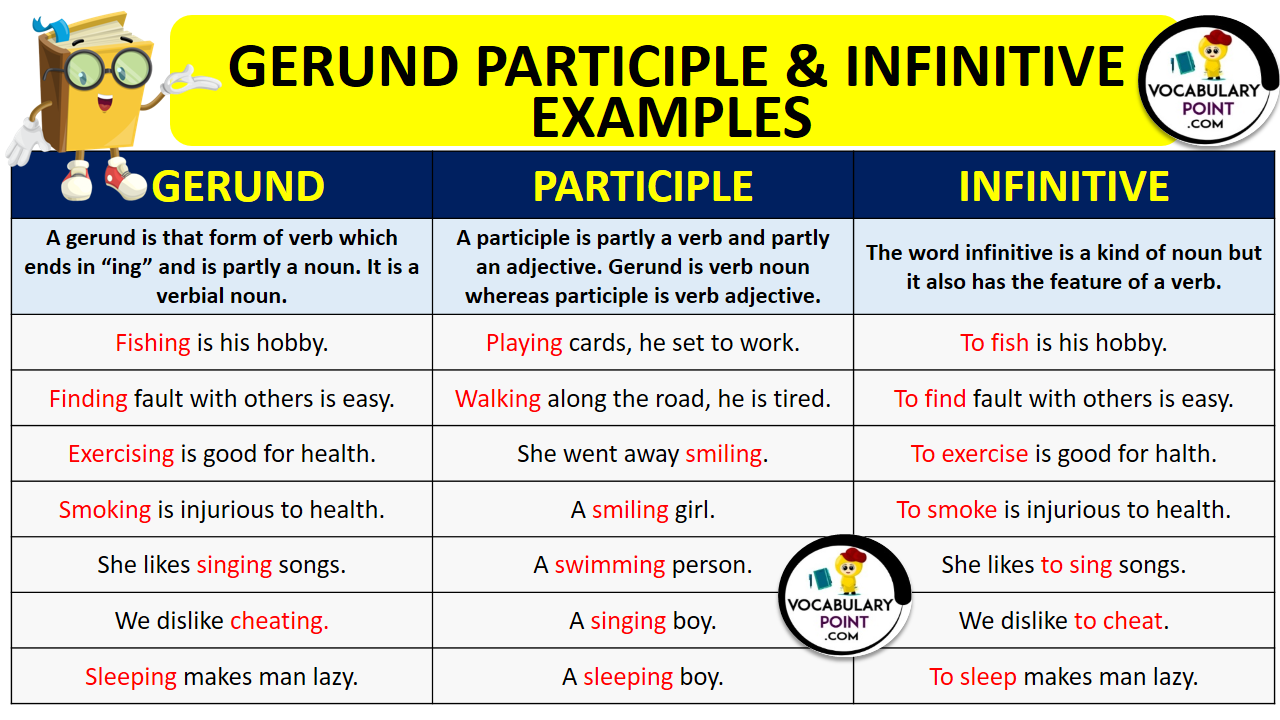GERUND PARTICIPLE INFINITIVE EXAMPLES. All the Examples of Gerund, infinitive and participle with their uses examples and rules are listed here in pdf. If you want to know about gerund , participle, infinitive so you are in a right place all the detailed lesson are listed here.so must read them because it is an informative lesson for the beginners. Difference between gerund and infinitive with examples, infinitive rules.
Must read : Phrase and Clause
What are the Gerund, Participle & infinitive ?
Gerund:
A gerund is partly a verb and partly a noun.
Participle:
A participle is partly a verb and partly an adjective. Gerund is verb noun whereas participle is verb adjective.
Infinitive
The word infinitive is a kind of noun but it also has the feature of the verb.
GERUND PARTICIPLE INFINITIVE EXAMPLES
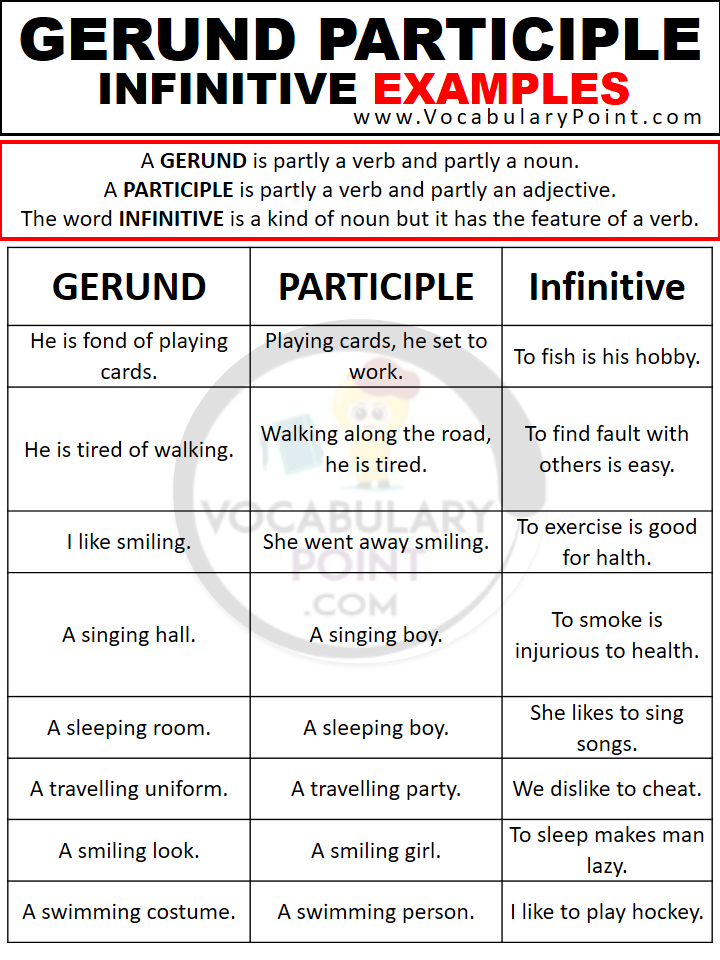
GERUND
A gerund is that form of verb which ends in “ing” and is partly a noun. It is a verbial noun.
Both gerund and infinitive have the force of a noun and a verb. Therefore, there use are also similar.
Smoking is injurious to health.
Smoking word is made by smoke +ing and it is work as a noun and also it is a verb or works as the subject. That’s why it is verb noun and called gerund.
A GERUND MAY BE USED AS UNDER
- Subject of a verb
- Smoking is injurious to health.
- Drinking breeds many diseases.
- Walking is useful for health.
- Object to a transitive verb
- I hate
- Children stopped
- We enjoy playing on Sunday.
- Subject to a preposition
- She is fond of singing.
- I am tired of
- Complement to a verb
- Seeing is
- The most hated thing is
- Hearing is
- What he likes best is fishing.
- As a compound noun
A flying plane (A plane for flying)
A frying pan. (A pan for frying)
A swimming costume (A costume for swimming)
- Preceded by a noun or a pronoun
When a gerund is preceded by a noun or a pronoun, it must be in the possessive form. As the gerund is finally a noun.
- He insisted on my being present in the meeting.
- I hope you will excuse my leaving
- She persisted in ali’s staying with her.
Sometimes, a gerund in the possessive case is not used:
When it denotes a lifeless thing.
There is no possibility of train coming late.
There is possibility of bus being late.
I hope the car reaching soon.
When a plural noun ends in “s”
I like boys playing hockey.
She wants the girls being present.
I want the toys being imported.
When Gerund is used in the passive form.
He was being sent to jail.
Shaba was being dismissed from service.
Students were being taught a lesson.
Must Read: Vocabulary words A to Z
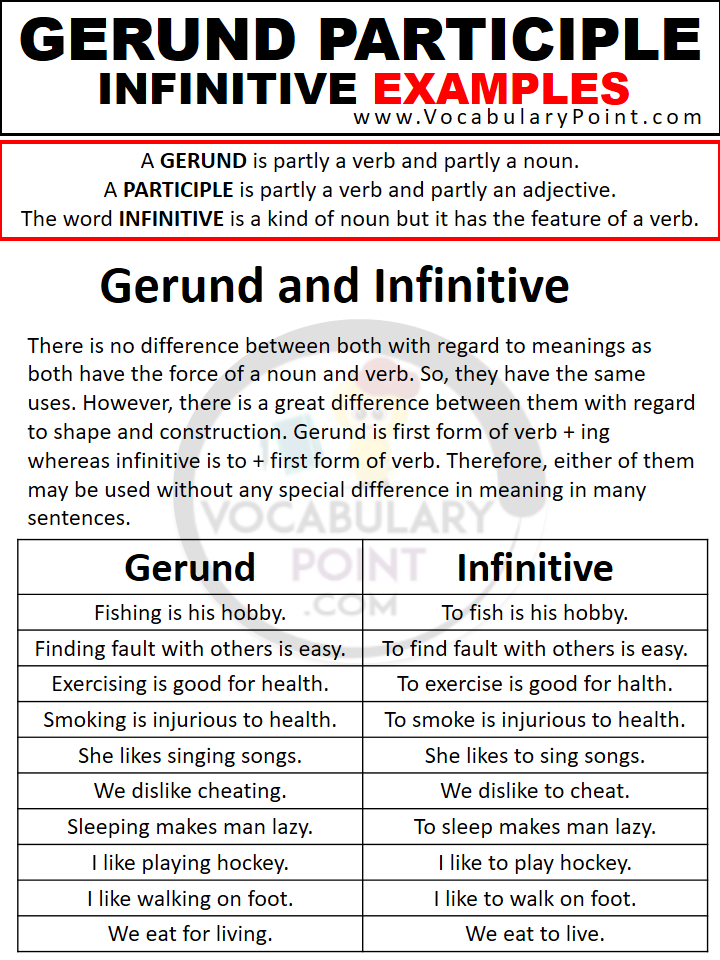
Gerund and Infinitive
There is no difference between both with regard to meanings as both have the force of a noun and verb. So, they have the same uses. However, there is a great difference between them with regard to shape and construction. Gerund is first form of verb + ing whereas infinitive is to + first form of verb. Therefore, either of them may be used without any special difference in meaning in many sentences.
| Gerund | Infinitive |
| Fishing is his hobby. | To fish is his hobby. |
| Finding fault with others is easy. | To find fault with others is easy. |
| Exercising is good for health. | To exercise is good for halth. |
| Smoking is injurious to health. | To smoke is injurious to health. |
| She likes singing songs. | She likes to sing songs. |
| We dislike cheating. | We dislike to cheat. |
| Sleeping makes man lazy. | To sleep makes man lazy. |
| I like playing hockey. | I like to play hockey. |
| I like walking on foot. | I like to walk on foot. |
| We eat for living. | We eat to live. |
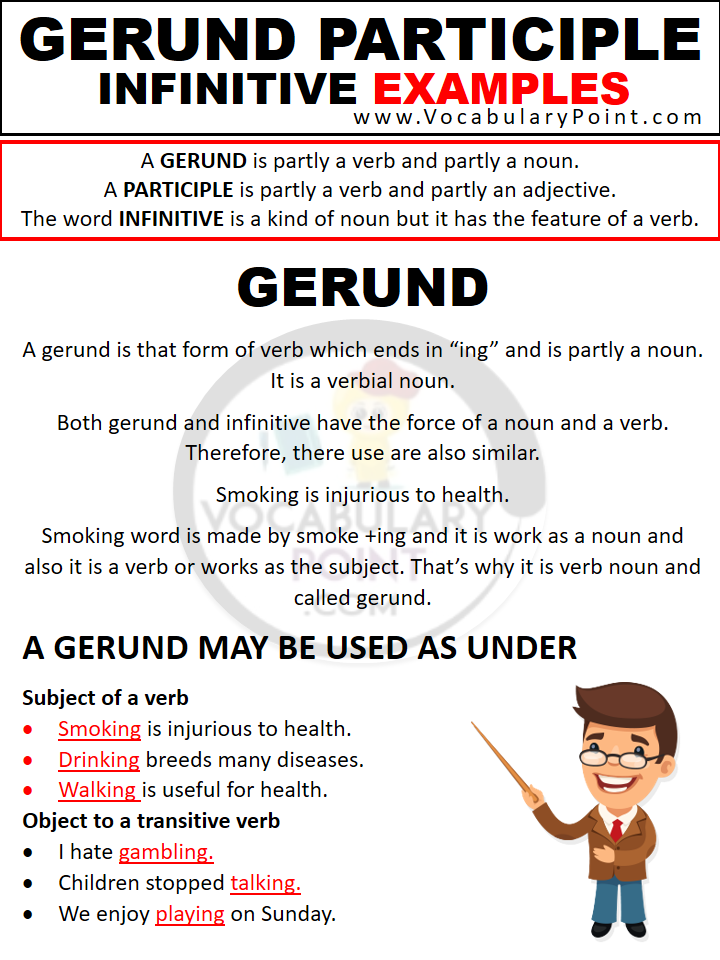
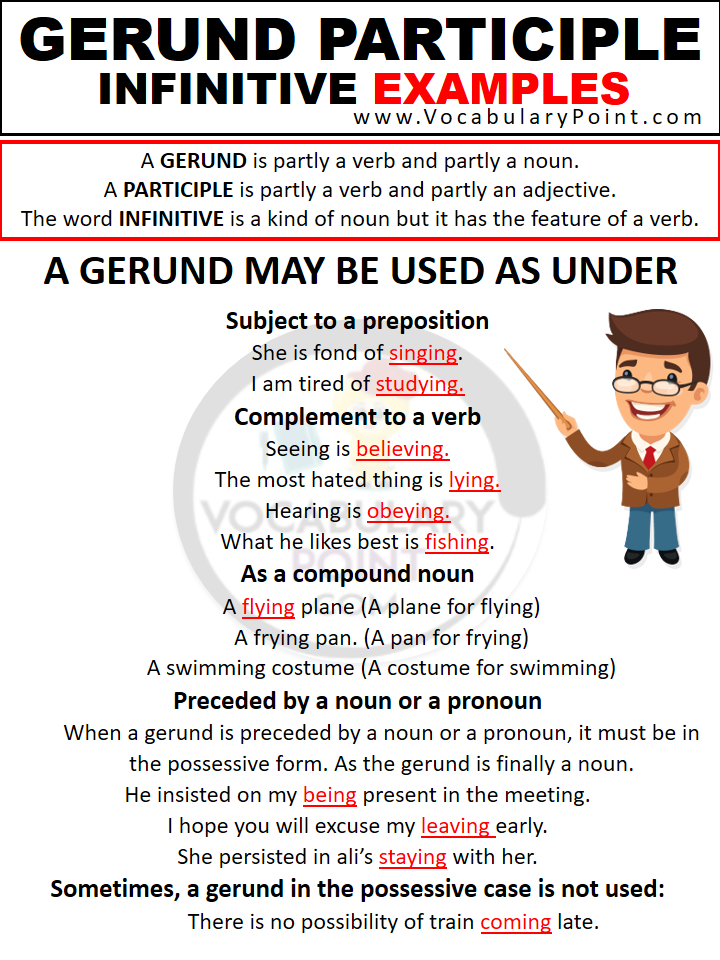
GERUND INFINITIVE PARTICIPLE EXERCISES
- Smoking is injurious to health.
- Hunting is my favorite game.
- Flying birds look beautiful.
- I like smiling
- He dislikes standing in a queue.
- I am fond of hunting.
- I hate
- She taught me
- Gambling is a bad habit.
- Reading gives me joy.
- Children love
- I disapprove of sleeping all the time.
- Smoking is not allowed in the office.
- Give is better than
- Swimming is his hobby.
- Tell lies leading to problems.
- Questions is easier than
- Drinking breeds many diseases.
- I thanked him for coming
- Will you excuse my leaving early?
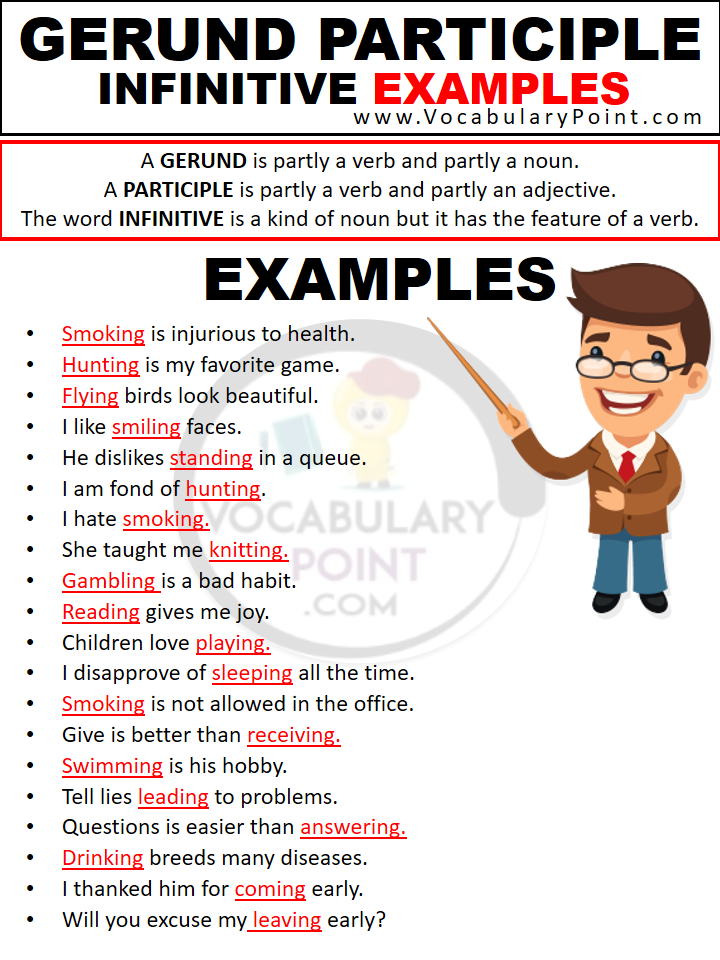
DIFFERENCE BETWEEN GERUND AND PARTICIPLE
| GERUND | PARTICIPLE |
| He is fond of playing cards. | Playing cards, he set to work. |
| He is tired of walking. | Walking along the road, he is tired. |
| I like smiling. | She went away smiling. |
MORE DIFFERENCE BETWEEN GERUND AND PRESENT PARTICIPLE
| GERUND | PARTICIPLE |
| A singing hall. | A singing boy. |
| A sleeping room. | A sleeping boy. |
| A travelling uniform. | A travelling party. |
| A smiling look. | A smiling girl. |
| A swimming costume. | A swimming person. |
NOTE: in the examples above, we find one word common in every two sentences but the second is different. We see that when the “ing” verb is followed by a person, it forms verbal’s adjective but when it is followed by an inanimate thing, it forms a compound noun.
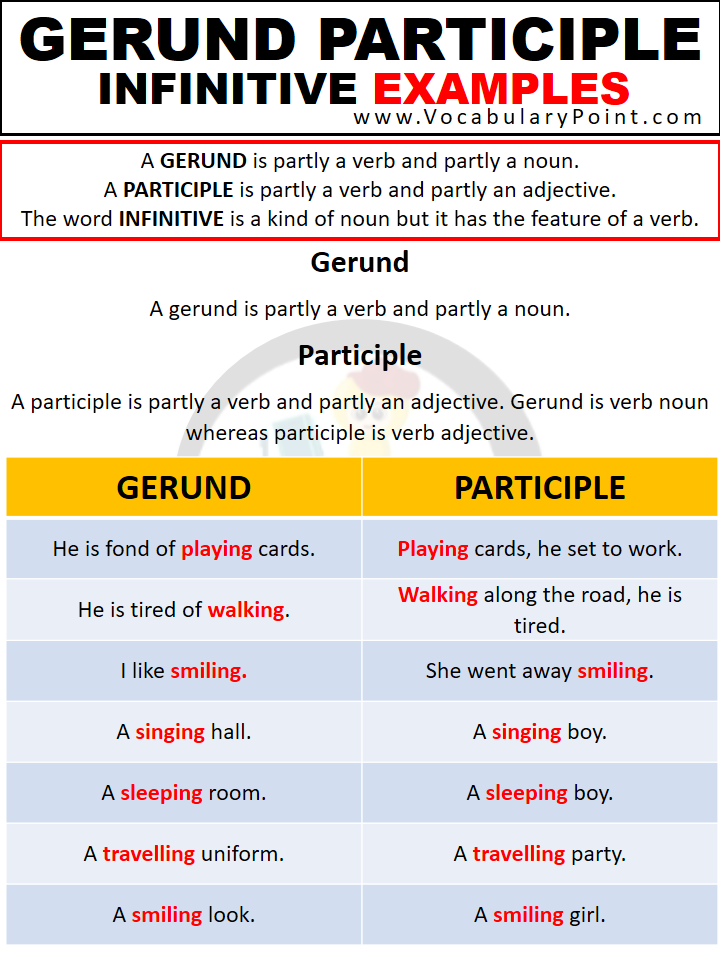
Use of Participle
- Present Participle
A participle qualifies a noun
- A bubbling spring is very beautiful to look at.
- Never try to get into the running
- A rolling stone gathers no moss.
- Hearing the noise, the baby woke up.
- If present participle is made from a transitive verb, it takes an object.
- I met a student carrying a bag of books.
- There came a man carrying a basket of apples.
- We met a girl carrying a bunch of flowers.
- It is used to denote the second activity after the completion of the first.
- Washing his hands, he ate fruit.
- After finishing the work, we went out for a walk.
- Writing an essay, he went to buy fruit.
- It is used in continuous tense.
- I am playing
- We were learning our lessons.
- He will be coming home soon.
- It may govern a pronoun.
- Hearing him speak, I was pleased.
- Seeing him fall from the tree, I rushed to help him.
- It may be modified by an adverb.
- Loudly knocking at the gate, he asked permission.
- Frankly speaking, it was not my intention to harm you.
- It may be modified by an adverb of degree such as: very, too, quite, or rather.
- It was very charming
- He is rather
- It may be used attributively.
The thundering clouds frightened the child.
The roaring lion escaped the cage.
- It may be used predicatively.
- He kept me waiting.
- The teacher kept him
- Absolutely with a noun or pronoun going before it.
The weather being fine, we went out to work.
Allah willing, we will certainly succeed.
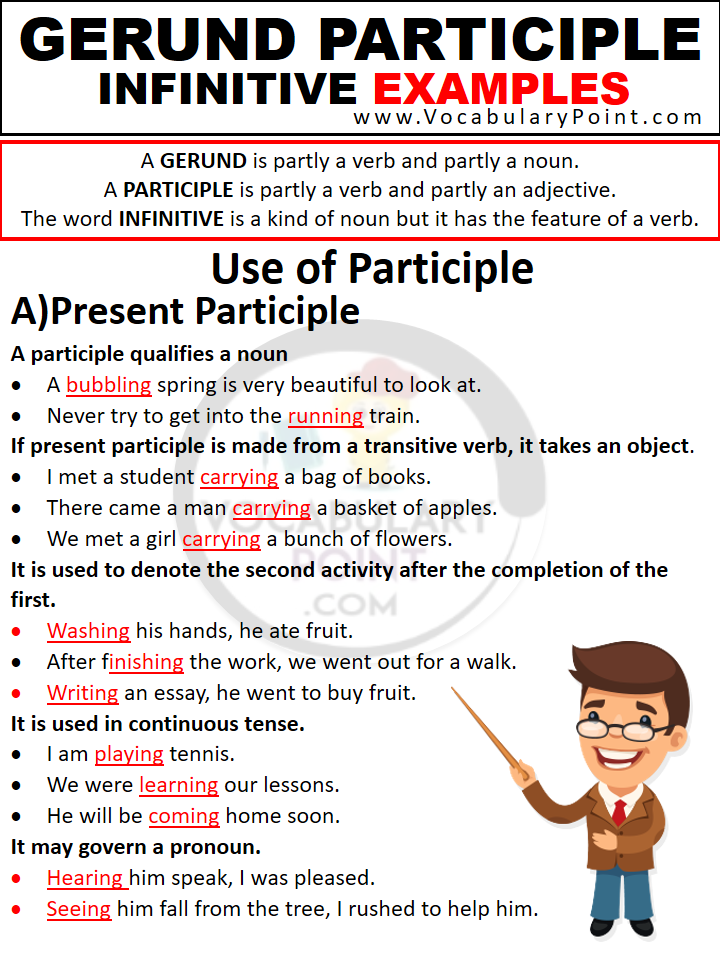
- C. PERFECT PARTICIPLE (Having + Past participle)
It is a verbal adjective form of verb converted into third form of verb. Having is used before it.
- Having worked hard, he went to sleep.
- Having loaded the cart, the farmer went home.
- The sun having set, we came home.
- Perfect participle may be the combination of present participle and past participle. It may be in active voice or passive voice.
- Having read the book, we went to school.(Active voice)
- Having been warned by me, he became serious.(Passive Voice)
- Having learnt the lesson, we began to play.(Active voice)
- Having been notified by the principal, the student appeared before the committee. (Passive voice)
NOTE: Present participle with continuous tenses of verb.
- I am taking
- I was taking
- I shall be taking
Past participle with perfect tenses of verb “Have”.
- I am beaten.
- I was
- I shall be beaten.
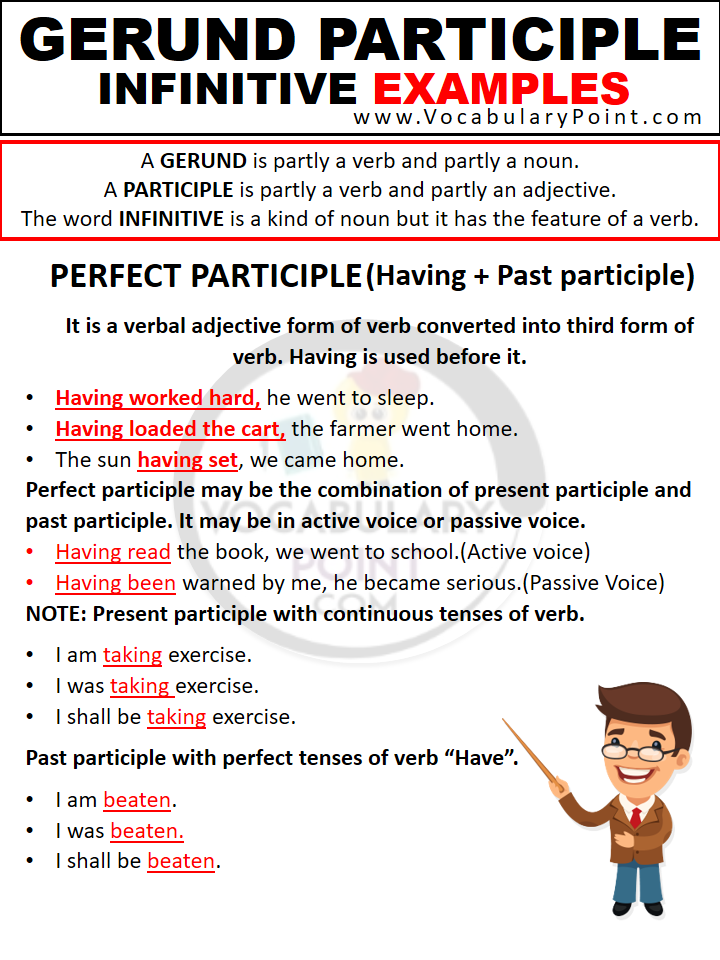
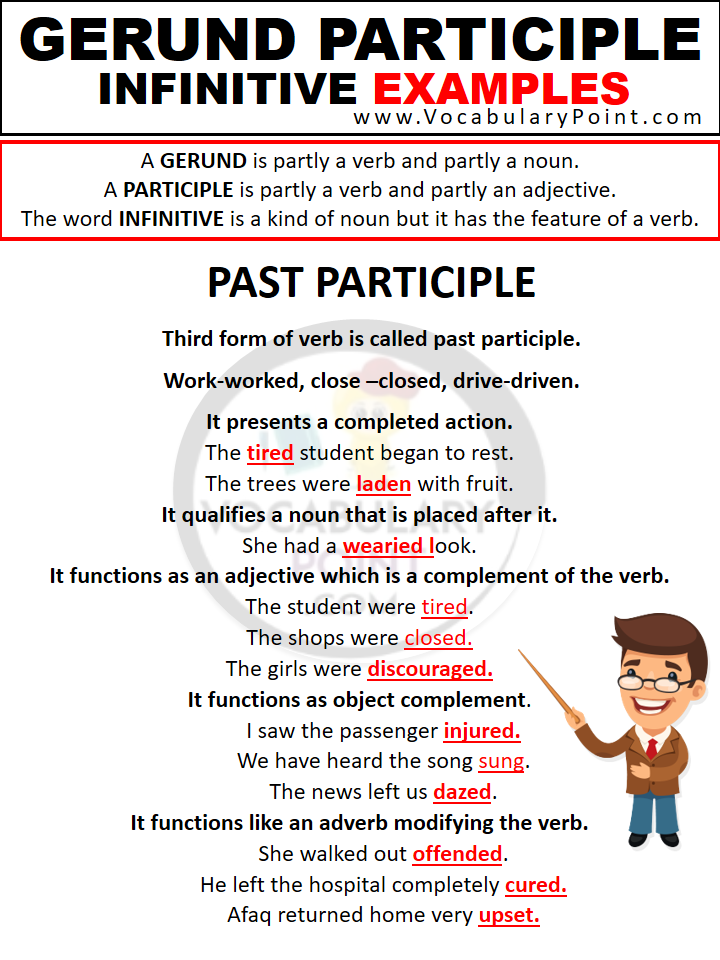
- PAST PARTICIPLE
Third form of verb is called past participle.
Work-worked, close –closed, drive-driven.
- It presents a completed action.
- The tired student began to rest.
- The trees were laden with fruit.
- Blinded by dust- storm, we lost our way.
- The frightened child began to cry.
- It qualifies a noun that is placed after it.
- She had a wearied l
- Broken marble can injure feet.
- The injuried men were crying for water.
- It functions as an adjective which is a complement of the verb.
The student were tired.
The shops were closed.
The girls were discouraged.
- It functions as object complement.
I saw the passenger injured.
We have heard the song sung.
The news left us dazed.
- It functions like an adverb modifying the verb.
She walked out offended.
He left the hospital completely cured.
Afaq returned home very upset.
- It helps to form adjective phrase by qualifying the noun placed before it.
The oranges plucked yesterday are still unripe.
The goods stolen from the market have been recovered.
People injured in the accident were shifted to the hospital.
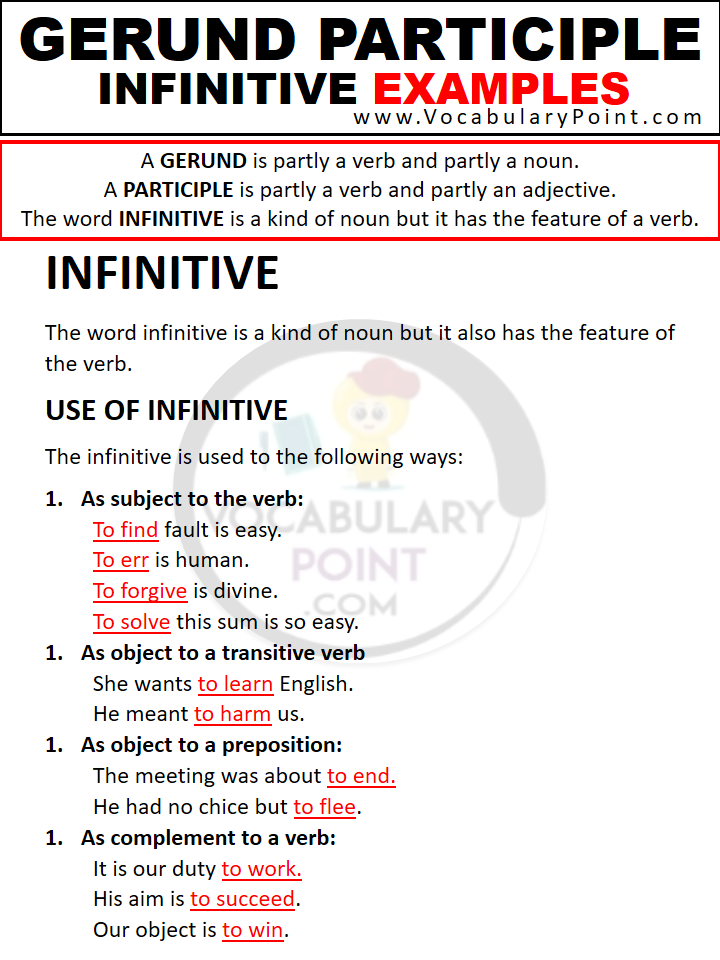
INFINITIVE
The word infinitive is a kind of noun but it also has the feature of the verb.
USE OF INFINITIVE
The infinitive is used to the following ways:
- As subject to the verb:
To find fault is easy.
To err is human.
To forgive is divine.
To solve this sum is so easy.
- As object to a transitive verb
She wants to learn English.
He meant to harm us.
We want to write an essay.
- As object to a preposition:
The meeting was about to end.
He had no chice but to flee.
The school is about to start.
- As complement to a verb:
It is our duty to work.
His aim is to succeed.
Our object is to win.
- As an objective complement:
We saw him dance.
She saw the baby weep.
I saw him work.
- To qualify a verb
We want to dance.
He came to study.
I exercise to be healthy.
- To Qualify an adjective:
Syrup was sour to taste
Mango is sweet to taste.
We are overjoyed to meet you.
- To qualify a noun:
This is the time to return.
This is month to prepare for test.
This is the scene to be appreciated.
- To Qualify a sentences:
- To sum up details, he is a gentleman.
- To open off the issue, his case was postponed.
- To conclude the matter, we worked hard.
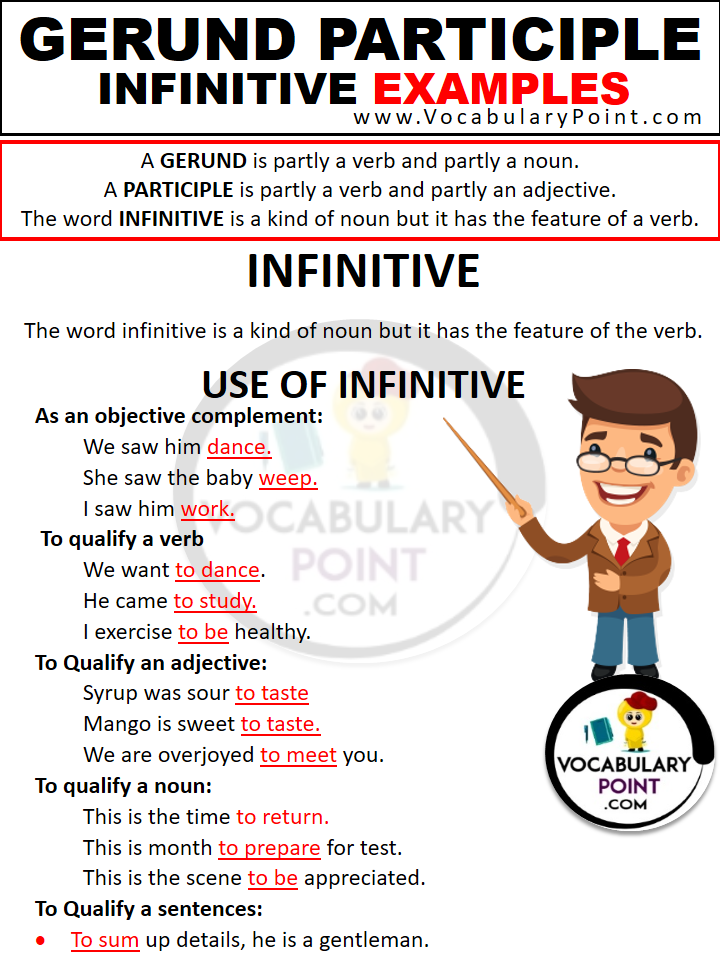
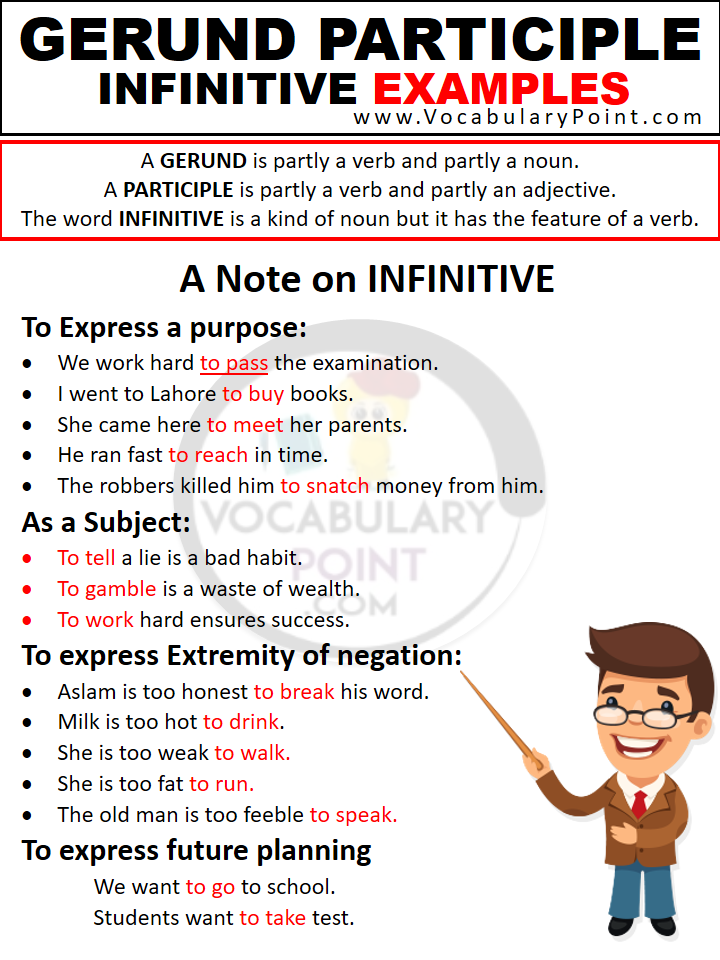
A Note on INFINITIVE
To Express a purpose:
- We work hard to pass the examination.
- I went to Lahore to buy
- She came here to meet her parents.
- He ran fast to reach in time.
- The robbers killed him to snatch money from him.
As a Subject:
- To tell a lie is a bad habit.
- To gamble is a waste of wealth.
- To work hard ensures succees.
- To offer prayer is our duty.
- To cheat others is a spot on character.
To express Extremity of negation:
- Aslam is too honest to break his word.
- Milk is too hot to drink.
- She is too weak to walk.
- She is too fat to run.
- The old man is too feeble to speak.
To express future planning
We want to go to school.
Students want to take test.
Girls want to go out for shopping.
Baby wants to play with toy.
She wants to knit a sweater.
To express wish and desire:
I wish to become a great scientist.
We wish to meet you today.
Boys want to work hard to pass the examination.
She wants to buy new books.
I wish to help you in the study.
For order or suggestion:
I ordered my brother to come early.
The teacher advised us to work hard.
I asked him to go there.
He advised me to reach in time.
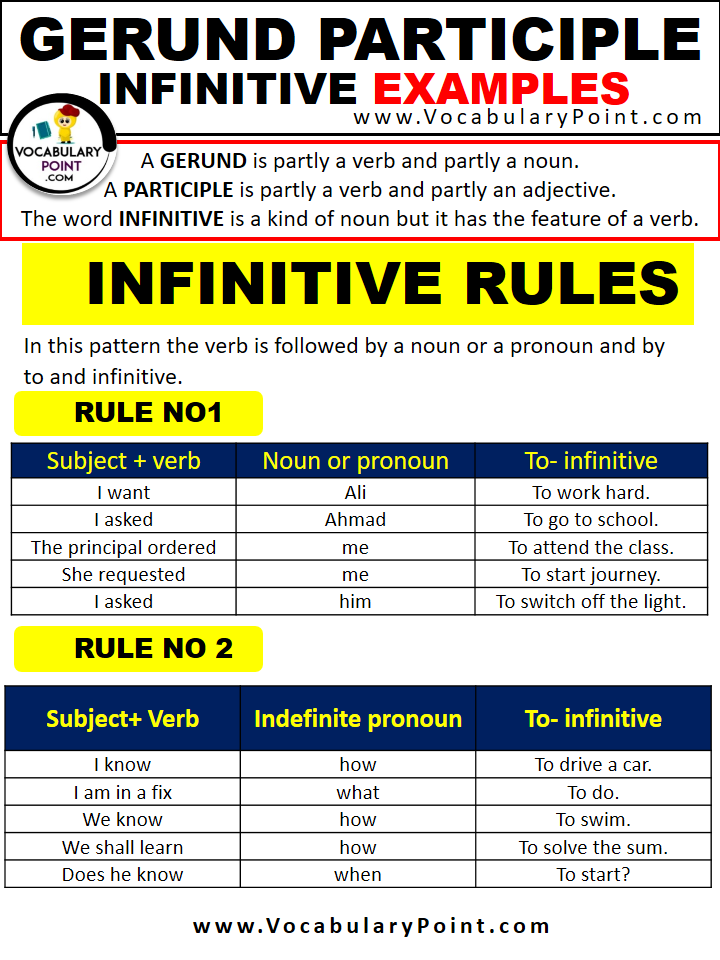
GERUND AND INFINITIVE RULES
RULE NO 1:
In this pattern the verb is followed by a noun or a pronoun and by to and infinitive.
| Subject + verb | Noun or pronoun | To- infinitive |
| I want | Ali | To work hard. |
| I asked | Ahmad | To go to school. |
| The principal ordered | me | To attend the class. |
| She requested | me | To start journey. |
| I asked | him | To switch off the light. |
RULE NO 2:
| Subject+ Verb | Indefinite pronoun | To- infinitive |
| I know | how | To drive a car. |
| I am in a fix | what | To do. |
| We know | how | To swim. |
| We shall learn | how | To solve the sum. |
| Does he know | when | To start? |
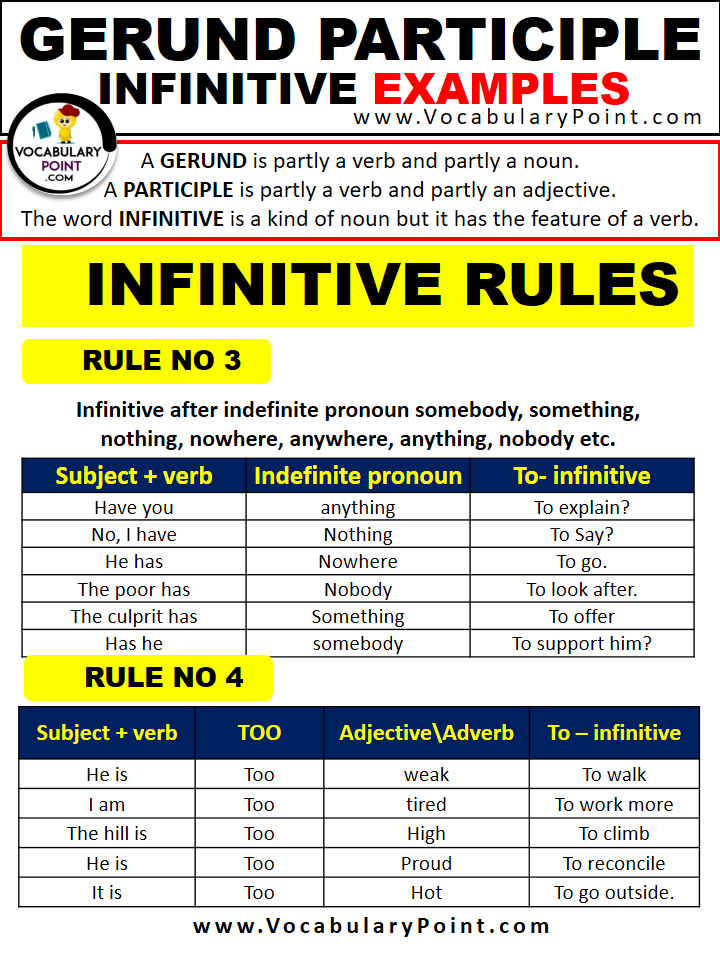
RULE NO 3:
Infinitive after indefinite pronoun somebody, something, nothing, nowhere, anywhere, anything, nobody etc.
| Subject + verb | Indefinite pronoun | To- infinitive |
| Have you | anything | To explain? |
| No, I have | Nothing | To Say? |
| He has | Nowhere | To go. |
| The poor has | Nobody | To look after. |
| The culprit has | Something | To offer |
| Has he | somebody | To support him? |
RULE NO 4: Use of infinitive after “too”
| Subject + verb | TOO | Adjective\Adverb | To – infinitive |
| He is | Too | weak | To walk |
| I am | Too | tired | To work more |
| The hill is | Too | High | To climb |
| He is | Too | Proud | To reconcile |
| It is | Too | Hot | To go outside. |
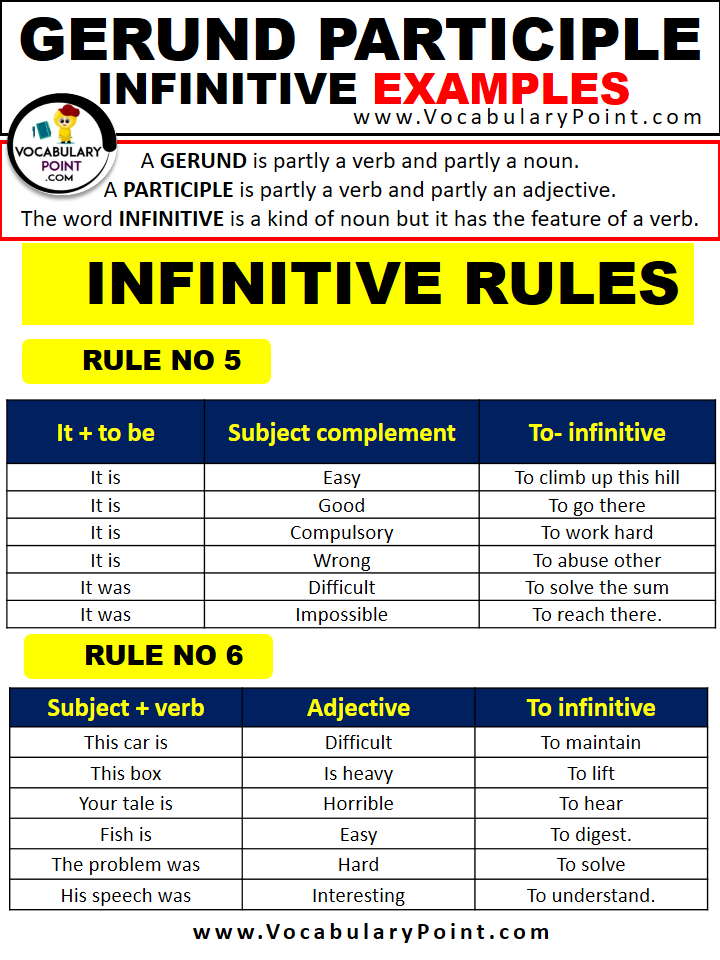
RULE NO 5: infinitive after anticipatory “IT”
| It + To be | Subject complement | To- infinitive |
| It is | easy | To climb up this hill |
| It is | Good | To go there |
| It is | Compulsory | To work hard |
| It is | Wrong | To abuse other |
| It was | Difficult | To solve the sum |
| It was | Impossible | To reach there. |
RULE NO 6: use of infinitive after some adjectives.
| Subject + verb | adjective | To infinitive |
| This car is | Difficult | To maintain |
| This box | Is heavy | To lift |
| Your tale is | Horrible | To hear |
| Fish is | Easy | To digest. |
| The problem was | Hard | To solve |
| His speech was | interesting | To understand. |
RULE NO 7: use of infinitive after “Enough”
| Subject + verb | Adjective\ adverb | Enough | To infinitive |
| He is | wise | Enough | To tackle this. |
| Ahmad is | Strong | Enough | To lift this box. |
| She was | Kind | Enough | To guide me. |
| He is | Bold | Enough | To retaliate. |
| He speaks | Loud | Enough | To be heard. |
| We are | Generous | Enough | T help the poor. |
You can Download list of gerund, infinitive and participles examples pdf
